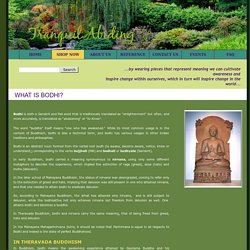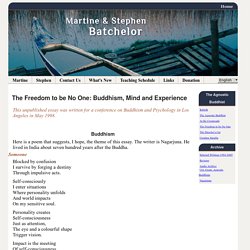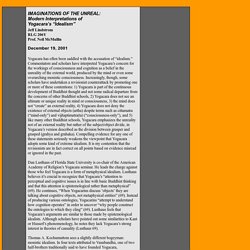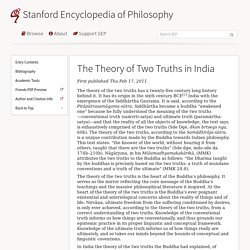

About Ecofeminism — Carol J. Adams. For this new anthology, Lori and I created a chapter called “Groundwork” in which we say, “Look--these ideas, these ecofeminist ideas, this is not new, this is not recent; we have been intersectional and we have been engaging around these ideas for a long time and it is important for us to recognize it.”

Ecofeminism allows for the articulation of an ethic of care. Indian Philosophy. What_is_bodhi. Bodhi is both a Sanskrit and Pali word that is traditionally translated as "enlightenment" but often, and more accurately, is translated as "awakening" or "to Know".

The word "buddha" itself means "one who has awakened. " While its most common usage is in the context of Buddhism, bodhi is also a technical term, and bodhi has various usages in other Indian traditions and philosophies. Bodhi is an abstract noun formed from the verbal root budh (to awake, become aware, notice, know or understand,) corresponding to the verbs bujjhati (Pāli) and bodhati or budhyate (Sanskrit). The Freedom to be No One. This unpublished essay was written for a conference on Buddhism and Psychology in Los Angeles in May 1998.

Buddhism Here is a poem that suggests, I hope, the theme of this essay. The writer is Nagarjuna. He lived in India about seven hundred years after the Buddha. Someone Blocked by confusion I survive by forging a destiny Through impulsive acts. It would undermine the power of Nagarjuna's poem to dissect it for general psychological truths. The status of Buddhism is as problematic as that of Nagarjuna. Such assumptions are difficult to weed out once they have taken root.
So is Buddhism a psychology or psychotherapy? Yogacara. IMAGINATIONS OF THE UNREAL: Modern Interpretations of Yogacara’s “Idealism” Jeff Lindstrom Prof.

Neil McMullin Yogacara has often been saddled with the accusation of “idealism.” Commentators and scholars have interpreted Yogacara’s concern for the workings of consciousness and cognition as a belief in the unreality of the external world, produced by the mind or even some overarching monistic consciousness.
41_45.pdf. The Theory of Two Truths in India. 1.

Ābhidharmikas / Sarvāstivāda (Vaibhāṣika) In the fourth century, Vasubandhu undertook a comprehensive survey of the Sarvāstivāda School's thought, and wrote a compendium, Treasury of Knowledge, (Abhidharmakośakārikā AbhiDK; Mngon pa ku 1b–25a) with his own Commentary on the Treasury of Knowledge (Abhidharmakośabhāṣya AbhiDKB, Mngon pa ku 26b–258a). This commentary not only offers an excellent account of the Sarvāstivādin views, including the theory of the two truths, but also offers a sharp critique of many views held by the Sarvāstivādins. Vasubandhu based his commentary on the Mahāvibhāṣā (The Great Commentary), as the Sarvāstivādins held their philosophical positions according to the teachings of the Mahāvibhāṣā. Consequently, Sarvāstivādins are often known as Vaibhāṣikas. The Sarvāstivādin's ontology[2] or the theory of the two truths makes two fundamental claims. 1.1 Conventional truth Pot and water are not the foundational entities. 1.2 Ultimate truth 2. 2.1 Ultimate truth 3.
THE BRAIN. Neuroscience. Brain. World Religions: Comparative Analysis. Online Buddhist Sutras, Scriptures, Texts and Related Media, in Chinese, Sanskrit and English, for Free. The Gateless Gate 無門關. The Gateless Gate The Gateless Gate or The Gateless Barrier (Chin.

Wu-wen kuan; Jap. Mumonkan) The author is Chinese Ch'an master Wu-men Hui-hai (無門慧開 Mumon Ekai, 1183-1260). English Translation. Advayavada & More. Being-determined and Self-determination are One (from Religion and Nothingness, by Prof. Keiji Nishitani, translated with an introduction by Prof. Jan van Bragt, and with a foreword by Prof. Winston L. The Project Gutenberg eBook of The Gospel Of Buddha, by Paul Carus. Do Buddhists have a funnybone? Syllabus Ioniers: Inhoudstafel. Anaximanders Apeiron. Welkom bij Filosofie Magazine. Wilhelm Schmid, De herontdekking van de liefde (voorpublicatie) Filosofie @ Wetenschap. Realisme (filosofie) - Wikipedia. Van Wikipedia is de naam van een aantal verschillende standpunten stromingen binnen de filosofie , die met elkaar gemeen hebben dat ze het bestaan van iets verdedigen dat door anderen wordt ontkend.
Wanneer de term 'realisme' heden ten dage gebruikt wordt zonder verdere specificatie zal men over het algemeen doelen op: ofwel (1) een standpunt in het met name in de Oudheid en de Middeleeuwen gevoerde debat over universalia , namelijk dat deze daadwerkelijk bestaan; ofwel (2) een positie binnen de twintigste eeuwse wetenschapsfilosofie , die kort gezegd inhoudt dat onze beste wetenschappelijke theorieën waar zijn, ook voor zover ze over niet-observeerbare entiteiten gaan. Filosofie voor beginners: Socrates, Plato, Aristoteles. Wetenschappelijke bewijsvoering: deductie, inductie en abductie.
Bij het opstellen van hypothesen en theorieën doen wetenschappers beroep op verschillende methoden van bewijsvoering.

Er zijn in grote lijnen drie verschillende methoden te onderscheiden, die met name verschillen in sterkte (de mate van zekerheid waarmee een theorie wordt ondersteunt) en de soort van verklaring. Deze drie methoden zijn deductie, inductie en abductie. Deductie Discussie over bewijsvoering tussen Plato en Aristoteles. Bron afbeelding: Wikipedia. Welke filosofische principes kennen we? Klassieke filosofie. Het Ene in de presocratische filosofie. Naar aanleiding van Anaximander, Heraclitus en Parmenides In het onderstaande wordt een inleiding gegeven in de presocratische filosofie.

Deze inleiding beoogt geen historische volledigheid of filologische adequaatheid.